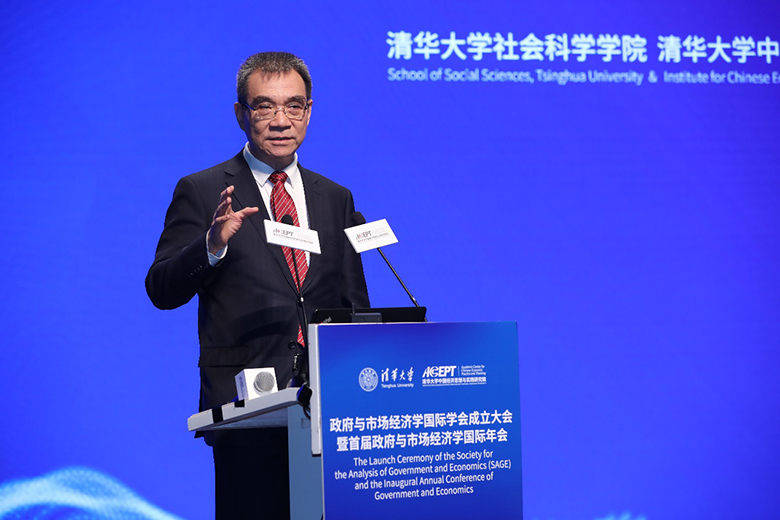
On April 27th, 2019, the Launch Ceremony of the Society for the Analysis of Government and Economics (SAGE) and the Inaugural Annual Conference of Government and Economics was held at the Mong Man Wai Concert Hall, Tsinghua University. Chen Xu, secretary of the CPC Committee of Tsinghua University and director of the School Affairs Committee, and Li Daokui, initiator and co-founding president of SAGE and president of ACCEPT addressed the conference respectively.
From the perspective of Lin Yifu, the development of China in the past seven decades since the founding of the People’s Republic of China is a gold mine of innovation on economic theories. The reform and opening up is a gradual process instead of one-step measures aimed at market-oriented transition and macro-stability all at once. Although the mainstream view of the world at that time was bearish about China’s transition and saw it the worst method, China achieved four decades of stable and rapid growth, which could be said to be a miracle in the history of the world economy. Whoever capable of explaining the driving forces behind such miracle will be able to put forward new theories in this respect. The SAGE founded by Li Daokui and Eric Maskin has three favorable conditions, namely, optimal timing, geographical convenience and human harmony. Mainstream theories tend to neglect the endogenous economic structure and the distorted endogenous nature of economy in transition , so they often fail to explain reasons for growth in specific cases. Developing countries have no comparative advantages in capital-intensive industries and no self-generating capacity. To achieve growth, they must rely on the government subsidy for protection. However, distorted government intervention leads to misallocation of resources and distorted incentives, so such growth is also unsuccessful. Many countries in transition adopt the market-oriented mechanism where the market plays a decisive role, and advocate clear-cut privatization of property rights, as well as measures of ensuring macro-stability. However, they have neglected that the subsidy for protection that existed before the transitional period is a distortion in itself. After the withdrawal of subsidies, these industries will inevitably go bankrupt, resulting in a large number of unemployment. From the perspective of new structural economics, it is utterly important to cope with the relationship between government and market well during economic development and transition. Only with market can resources be well allocated. With competition, incentives can be given for innovation, and there will be compensation for pioneers. In the meantime, during industrial upgrading and technological innovation, the government should play a role in enhancing education, finance and infrastructure construction.
Lin Yifu pointed out that there was a common phenomenon during the application of mainstream economics in developing countries, namely, these counties could elaborate on the issues in an explicit manner, but when they attempted to replicate the method, they basically failed. In Mr. Lin’s opinion, it is quite appropriate for the newly established SAGE to focus on the economics of government and market. He expressed his wishes that SAGE could help developing countries to better understand the world. The Institute of New Structural Economics at Peking University looks forward to being a member of SAGE to seize the opportunity of the times and promote the development of economic theories.